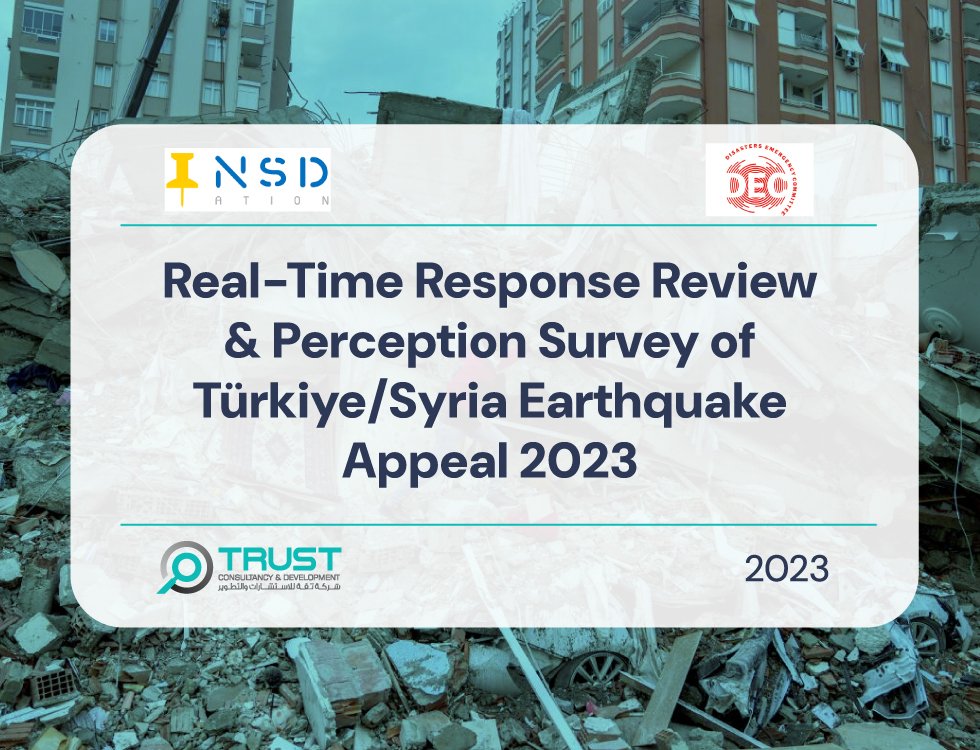Introduction
Following the devastating 7.8-magnitude earthquake in February 2023, Türkiye and Northwest Syria faced massive destruction, with millions displaced amid harsh winter conditions. The DEC Türkiye Syria Earthquake (TSE) Appeal launched shortly afterward to mobilize a coordinated humanitarian response. Fourteen DEC member agencies, working with local partners, provided emergency relief across food, shelter, health, and sanitation sectors, addressing immediate needs in some of the hardest-hit regions. This real-time review evaluates the response’s effectiveness and identifies areas for improvement to strengthen resilience and future preparedness.
Methodology
The review combined qualitative and quantitative methods, including key informant interviews and perception surveys with affected populations, gathering diverse perspectives from local authorities, DEC agencies, and community stakeholders. The approach allowed the review team to assess the response’s alignment with core humanitarian standards (CHS) and Grand Bargain commitments, focusing on timeliness, effectiveness, and inclusiveness of the assistance provided.
Main Findings
- Appropriateness and Relevance: The DEC-funded response was largely successful in meeting urgent needs. DEC member agencies demonstrated adaptability, adjusting activities like food distribution and emergency shelter provisions to evolving conditions. However, general needs assessments led to gaps in reaching highly vulnerable groups, indicating a need for more targeted data.
- Timeliness and Effectiveness: The collaboration among DEC agencies and local partners facilitated a quick and coordinated response. Challenges such as delays in cash transfers and supply chain issues in Syria, however, occasionally hampered timeliness. Recipients widely expressed that short-term needs were addressed, but many voiced concerns about the absence of long-term solutions, especially for sustainable livelihoods.
- Quality and Satisfaction: Surveyed beneficiaries generally rated the quality of assistance, including food and mobile health clinics, as good to excellent. However, certain items, like hygiene kits, fell short in quality and relevance, highlighting areas for refinement in future distributions.
- Feedback and Inclusion: Communication and feedback channels were actively established, though there were challenges. Some affected individuals, especially women and people with disabilities, faced additional barriers in accessing assistance, signaling an opportunity to strengthen inclusive approaches and complaint mechanisms.
- Environmental and Long-Term Resilience: Environmental considerations were minimal in Phase 1, though a few agencies took steps such as using sustainable packaging and local procurement. Disaster Risk Reduction (DRR) activities were limited, indicating a need for greater focus on resilience-building in future phases to address ongoing vulnerabilities.
- Lessons and Future Directions: The review calls for Phase 2 to incorporate long-term priorities, including DRR and livelihood support, and to reinforce partnerships with local authorities for more sustainable outcomes. Ensuring flexibility and targeted data collection will be essential for adaptive responses in future crises.
Conclusion
The DEC Türkiye/Syria Earthquake Appeal response effectively addressed urgent needs in a challenging context, providing vital support in food, shelter, and health. While the response was adaptable and well-coordinated, the review highlights areas for improvement, such as better targeting of vulnerable groups, enhancing feedback systems, and focusing on long-term resilience.
As the response progresses, prioritizing sustainability, resilience-building, and Disaster Risk Reduction (DRR) will be crucial to ensure that both immediate and future needs are met. The lessons learned from this experience will guide efforts toward a stronger, more resilient recovery for communities in Türkiye and Syria.


